Gianni Infantino elected president of Fifa
The Swiss will be tasked with restoring the battered reputation of football's governing body
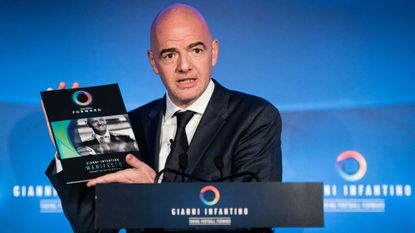
Gianni Infantino is the new president of Fifa, after beating rival Sheikh Salman bin Ebrahim al-Khalifa in a second round of voting at the organisation's congress in Zurich. He polled 115 votes to Shiekh Salman's 88, securing the overall majority he needed to win,
He said he wanted to work with all 209 member nations and "build a new era where we can put football at the centre of the stage".
The Swiss candidate, who had the backing of the English and Scottish FAs, will be tasked with taking over from disgraced former president Sepp Blatter, who stood down last year as the organisation was engulfed by a corruption scandal. He has since been banned from football for six years.
Subscribe to The Week
Escape your echo chamber. Get the facts behind the news, plus analysis from multiple perspectives.

Sign up for The Week's Free Newsletters
From our morning news briefing to a weekly Good News Newsletter, get the best of The Week delivered directly to your inbox.
From our morning news briefing to a weekly Good News Newsletter, get the best of The Week delivered directly to your inbox.
Earlier Fifa voted through a raft of reforms that should secure its future as Infantino oversees the task of rebuilding its battered reputation. Among the changes are limits on the president's powers and the creation of a new Fifa Council to replace the discredited executive committee.
Accounts, which will reveal for the first time Blatter's salary, are to be published at the next congress.
Fifa elections: reforms more important than a new president
26 February
Fifa has voted through a series of governance reforms, including disclosing the salaries of senior figures – among them the now-departed Sepp Blatter.
The changes, agreed at the footballing body's congress in Zurich, should be enough to secure the organisation's future under a new president, which was also being decided upon on Friday.
Backed by 89 per cent of the delegates (22 voted against), they also mean Fifa is likely to maintain its "victim status" in the eyes of the US and Swiss authorities investigating corruption at the organisation.
Had it rejected the new regulations and refused to change its governance, Fifa's status would have been "overturned from victim to criminal conspirator", said Keir Radnedge of World Soccer this week, and that would have brought the organisation "crashing down" and possibly bankrupted many of its smaller members.
The reform package will see many decision-making powers stripped from the president and executive committee, which will be renamed the Fifa Council and will feature a female member from each confederation. There will also be a 12-year term limit and stricter integrity checks for top officials.
- The changes include:
- The separation of powers between the political and business operations of Fifa;
- An independent audit and compliance committee;
- A new council to replace the executive committee;
- Term limits of 12 years for senior members;
- Publication of executive salaries and accounts.
"The full financial accounts for the previous year will be revealed at the next scheduled congress in Mexico in May and [are] expected to reveal a loss," reports The Guardian. "The figures will also reveal, for the first time, what the former president Blatter was paid."
Speaking before the vote, interim president Issa Hayatou warned the crisis engulfing Fifa had left a $550m (£397m) black hole in its finances. The huge legal costs associated with the scandal and the loss of sponsors anxious to distance themselves from the organisation's toxic brand have contributed to the financial problems, he said.
Although the "changes have merit", says Dan Road of the BBC, they "arguably constitute the minimum requirement with the organisation in such disrepute".
However, some fear that in practice, little will change. "Many wanted Fifa to change its rules to allow a credible figure from outside the sport to stand for president, to have non-executive directors on its council and to allow a fully independent, external commission to oversee the reforms," adds Roan.
That has not happened and instead, Fifa will reform itself. "But do not assume that it represents the end of this great scandal, or the solution to Fifa's troubles. We should all know better by now."
The reforms "signal a first small break from Blatterism", says Oliver Kay in The Times. "A new dawn, though? It does not feel as if that will happen any time soon."
Gianni Infantino is shock favourite for Fifa president
23 February
Whoever wins this week's presidential election at Fifa will have a tough task rebuilding the organisation's battered reputation after a survey found that almost 70 per cent of fans no longer had any confidence in football's governing body.
And if crucial reforms are not voted through at the congress in Zurich, then the winner could find themselves in charge of a failed organisation facing what Owen Gibson of The Guardian calls the "end game of complete institutional collapse".
Uefa secretary general Gianni Infantino (pictured above) has emerged as the unexpected favourite to win Friday's vote following the announcement that he had the backing of more than half of Africa's federations, despite the African Football Confederation's support of rival Sheikh Salman bin Ebrahim Al Khalifa.
FA-backed Infantino made the claim after a visit to South Africa, where he met his rival Tokyo Sexwale and visited Robben Island, where Sexwale was imprisoned in the 1970s, alongside Nelson Mandela.
If his claim is correct then the election "may have swung decisively" in his favour, reports The Times. "Africa is viewed as holding the balance of power in the election, with Sheikh Salman dominant in Asia and Infantino enjoying strong backing in Europe and the Americas."
Electioneering has reached "fever pitch" in Zurich, says the Daily Telegraph, which adds that Infantino is now on the brink of a "surprise victory". It suggests Sexwale, who was disappointed not get the formal backing of the African confederation, has asked his supporters to vote for Infantino in the second round.
Meanwhile, Transparency International has called for "real and irreversible change in 2016" after a poll found 69 per cent of football fans had no confidence in Fifa.
"Unless it acts, more fans will turn away from football," warned Gareth Sweeney, the author of the organisation's Global Corruption Report: Sport. "The trust levels are low but the fans will give Fifa a chance if it acts now."
That puts the organisation's proposed reform measures in the spotlight and there are very pressing reasons for them to be approved, says Keir Radnedge of World Soccer.
The US and Swiss authorities, probing the corruption claims, have awarded Fifa victim status so if it rejects the proposed reforms, the "the perception of the body itself will be overturned from victim to criminal conspirator".
That would bring Fifa "crashing down", concludes Radnedge. The larger nations would be unaffected but the collapse of the organisation that funds development in much of the world "would spell ruin for possibly more than 100 of its minnow members".
"This is why voting Yes to reform is not merely in the interests of Fifa but that of the member associations; far more important, even, than the identity of the next figurehead president."
Prince Ali bin al-Hussein fires starting pistol in Fifa race
15 October
Prince Ali bin al-Hussein has formally entered the race to become the new president of Fifa, and with the organisation in disarray and Michel Platini, the favourite to succeed Sepp Blatter, currently suspended from the game the Jordanian would appear to be the new front-runner.
Ali was Blatter's sole opponent at the Fifa presidential election in May, and secured 73 votes against 133 for Blatter in the first round, before withdrawing from a second round of voting.
Blatter's victory came as no surprise, despite the breaking corruption scandal at Fifa, yet most observers agreed that Ali had given the Swiss a bloody nose.
This time round he may have a clear run at the presidency. Blatter has pledged to stand aside, and any lingering thoughts of a last-minute change of heart must surely have been laid to rest by his suspension. Platini is battling to maintain his credibility after also falling foul of the ethics committee, while another contender, Chung Mong-joon of South Korea, has been been banned for six years after an investigation into the 2018 and 2022 World Cup bidding process.
"With Chung out of the election and Platini's hopes potentially terminally damaged... Ali has pitched himself as a clean-up candidate, while still being reassuringly a Fifa insider," says The Guardian.
A letter sent to the presidents and secretary-generals of all 209 national football associations contained what the paper calls a "soothing assurance" from Ali. "I am one of you," he wrote. "I have never lost sight of the fact that there are so many good and honest people within the global Fifa organisation."
Ali is also anxious that Fifa does not postpone the election. "Delaying the scheduled election would only postpone needed change and create further instability," he said.
Meanwhile, Platini is likely to find out if his hopes of taking over at Fifa are dead in the water as officials from Uefa, the governing body in Europe of which he is president, meet to discuss the situation.
"There is a genuine prospect that Uefa, European football's governing body, could abandon its president's bid to succeed Sepp Blatter as the head of Fifa." reports The Times.
Should Uefa reject Platini it could lead to Uefa throwing its weight behind Ali, says the paper. Although it could nominate another candidate, such as Michael van Praag, the president of the Dutch FA, who withdrew from the election in May in order to support Ali.
Nominations for the election close on 26 October.
Create an account with the same email registered to your subscription to unlock access.
Sign up for Today's Best Articles in your inbox
A free daily email with the biggest news stories of the day – and the best features from TheWeek.com
-
 Magazine interactive crossword - April 26, 2024
Magazine interactive crossword - April 26, 2024Puzzles and Quizzes Issue - April 26, 2024
By The Week US Published
-
 Magazine solutions - April 26, 2024
Magazine solutions - April 26, 2024Puzzles and Quizzes Issue - April 26, 2024
By The Week US Published
-
 Magazine printables - April 26, 2024
Magazine printables - April 26, 2024Puzzles and Quizzes Issue - April 26, 2024
By The Week US Published
-
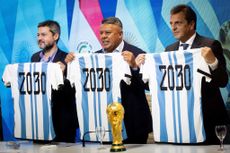 FIFA is embroiled in back-to-back controversies around the World Cup
FIFA is embroiled in back-to-back controversies around the World CupUnder The Radar The controversial selection of the 2030 hosts puts Saudia Arabia in a prime position for 2034
By Justin Klawans, The Week US Published
-
 Saudi Arabia's 2034 World Cup: glitz, glamour and 'grimly inevitable'
Saudi Arabia's 2034 World Cup: glitz, glamour and 'grimly inevitable'Talking Point Critics claim country is guilty of sportswashing as it stands unopposed to host tournament
By Julia O'Driscoll, The Week UK Published
-
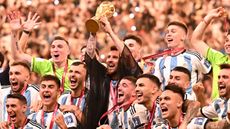 Fifa World Cup 2026 expansion: for the global game or for Fifa’s greed?
Fifa World Cup 2026 expansion: for the global game or for Fifa’s greed?Talking Point The men’s tournament co-hosted by Canada, Mexico and the USA will have a record 104 matches
By Mike Starling Published
-
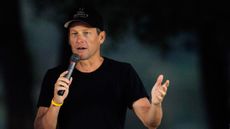 The biggest sports scandals of the 21st century
The biggest sports scandals of the 21st centuryIn Depth Lance Armstrong, Tiger Woods and football’s governing body have all shocked the world
By The Week Staff Published
-
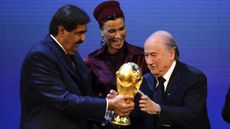 Qatar 2022: a tainted World Cup?
Qatar 2022: a tainted World Cup?Talking Point The most controversial Fifa World Cup yet is ready for kick-off
By The Week Staff Last updated
-
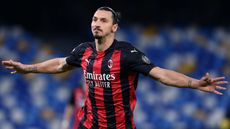 Zlatan vs. EA Sports: image rights row breaks out over Fifa video game
Zlatan vs. EA Sports: image rights row breaks out over Fifa video gameSpeed Read Milan striker and Spurs star Gareth Bale call for an investigation
By Mike Starling Published
-
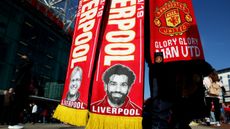 European Premier League: radical breakaway plot is revealed
European Premier League: radical breakaway plot is revealedSpeed Read Liverpool and Man Utd are reportedly in talks to join new Fifa-backed tournament
By Mike Starling Published
-
 Qatar 2022 World Cup: migrants still at work despite ban on gatherings
Qatar 2022 World Cup: migrants still at work despite ban on gatheringsSpeed Read With 1,000 days to go until the Fifa mega-event, it’s ‘business as usual’ on the crowded construction sites
By The Week Staff Published